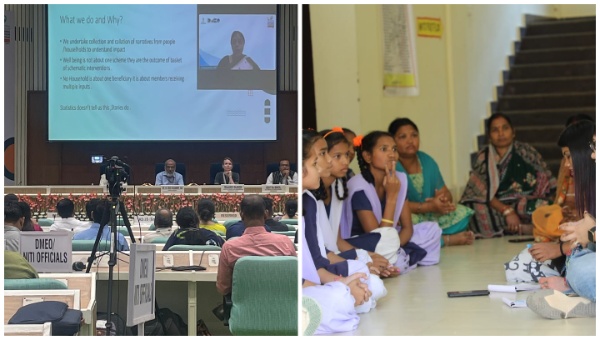Odisha: PHDMA’s Narrative-Based Monitoring & Evaluation Process Hailed At NITI Aayog Conference

Bhubaneswar: The narrative-based monitoring and evaluation technique adopted by Poverty and Human Development Monitoring Agency (PHDMA) of Odisha to assess the impact of programmes on the ground recently received NITI Aayog’s recognition.

Addressing a session at the National Conference for Monitoring, Evaluation and Learning (NCEML-2024) organised by the Development Monitoring and Evaluation Office (DMEO) of NITI Aayog in New Delhi, Member Secretary PHDMA Roopa Roshan Sahoo spoke about the qualitative monitoring methods adopted by the agency which puts people and their lived experiences on the forefront.
This method is in contrast to quantitative monitoring that shows outcomes without shedding any light on the impact that the initiatives have on people.
“Wellbeing is not about one scheme; they are the outcome of a basket of schematic interventions. We discuss with multiple beneficiaries in a household, listen to their lived experiences with the schemes, deeply observe their surroundings, visually document everything from the ground and finally collate the narratives to assess the impact,” Sahoo said during the panel discussion.
“Statistics doesn’t tell us this, stories do. Governance initiatives impact people’s lives. Prosperity is not in numbers, it’s in the stories that we see and will tell,” she explained further.
Sahoo informed the conference about the studies undertaken by PHDMA including Swabhiman Tales, an impact assessment study conducted at Swabhiman Anchal, the left-wing extremist-affected area in Odisha’s Malkangiri.
She said the study helped portray a clear picture of ongoing development works after the construction of Gurupriya Bridge and map the rising aspirations among residents.
Similarly, a narrative study conducted in Rayagada, Nabaraangpur and Nuapada districts to assess the availability of services and their utilities based on the Multi-dimensional Poverty Index (MPI) report, she said, provided perspectives that were useful as policy inputs.
PHDMA’s qualitative monitoring practice to shape policies was well-appreciated by the panelists and audiences present at the DMEO conference.

Comments are closed.